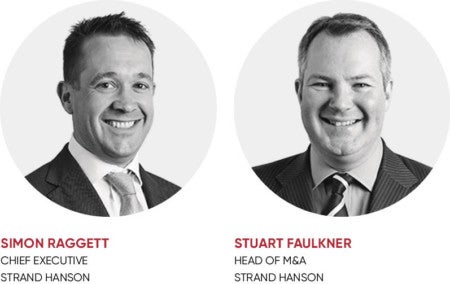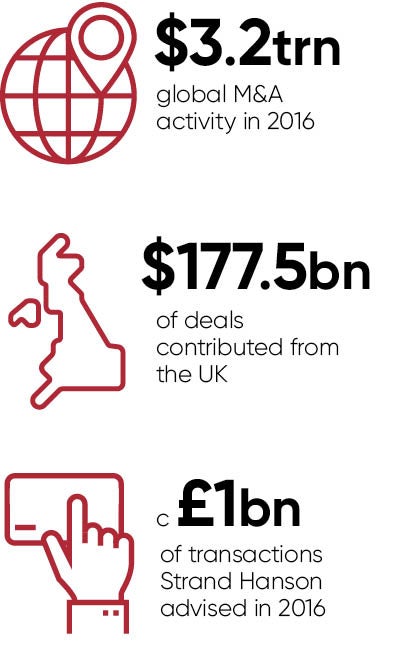
For many businesses, relying on organic growth and passing to the next generation no longer possess the same allure. Against a backdrop of emerging markets, new industry and increasing globalisation, businesses now have the opportunity to innovate, transform, merge and expand on an unprecedented scale.
Global M&A activity hit $3.2 trillion in 2016, with the UK alone contributing $177.5 billion-worth of deals. Despite a sea of political and economic change and uncertainty, it is a trend that looks set to continue, according to leading merchant bank Strand Hanson.
Stuart Faulkner, head of M&A, believes London will remain at the centre of global trade thanks to its prime position as a hub of world commerce and finance, and its embedded advisory culture.
“I expect to see current levels of activity continuing, and perhaps increasing, despite the uncertain global macroeconomic and political backdrop, given the benign interest rate environment and the weakness of sterling; the latter making UK plcs attractive to overseas bidders and long-term value-seekers,” he says.
However, while there is no shortage of opportunities, the successful execution of a deal relies heavily on choosing the right M&A adviser, particularly one who is able to add genuine value.
M&A is a relationship-driven business; its ability to thrive is based upon trust, which leads to mutually beneficial relationships
Traditionally, the domain of the bulge brackets, there is a shift in demand for innovative and independent advice, which has led to the rise of the boutique adviser. It is these advisers who are increasingly proving invaluable in navigating companies through the complex deal-making process, particularly among the small and mid-cap market, where deal flow is increasing and becoming evermore international in nature, while still structured in London.
Mr Faulkner explains: “There are likely to be conflicts of interest in firms where the bulk of revenue is generated by non-advisory business lines. M&A is a relationship-driven business; its ability to thrive is based upon trust, which leads to mutually beneficial relationships. This is why independence is so important.”
The role of a successful M&A adviser should go beyond that of simply executing transactions. Many smaller businesses do not have an internal M&A department and, therefore, Strand Hanson often adopts the role of “consigliere”, guiding such clients through all aspects of the process, providing the valuation and execution skillsets, and in many cases identifying acquisition opportunities.
Responsible for advising on some £1 billion-worth of transactions in 2016, Strand Hanson is testament to the growing desire among clients for an approach that places importance on ongoing, creative, independent advice.

Since its inception in 1993, Strand Hanson has grown to become one of London’s leading advisory boutiques, working alongside companies in both developed and emerging markets. Offering AIM, UKLA, NEX and Code expertise, Strand Hanson, headed by chief executive Simon Raggett, who led the firm’s MBO in 2009, boasts the rare advantage of being entirely management owned and prides itself on being able to forge long-standing relationships with its extensive, global client base.
“Where some advisers will see transactions as one-offs, there is undeniable value in forging long-term relationships, as this offers the benefits of retained knowledge and consistency of advice, and a true understanding of the needs of the client,” says Mr Faulkner. “Our ownership structure means we have a fast-reacting and flexible approach, and can always act in our clients’ best interests.”
It’s no secret that acquiring or selling a business comes with challenges. As companies grow more ambitious in an increasingly competitive business landscape, deals are made, not only with a view to improving the bottom line, but also to broaden their capabilities and offerings. However, as the appetite for lucrative deals grows, so too does the complexity of transactions, and success relies upon collaborative leadership and genuine subject-matter expertise across a range of jurisdictions and disciplines.
According to Mr Faulkner, the key is for the lead M&A adviser to ensure all professional advisers work together seamlessly, to ensure the client gets the best possible service and advice from its advisory team.
“We need to be able to manage the overall process, and be the key liaison with regulators and the client, as well as bringing together all other advisers such that they work collaboratively, rather than independently,” he adds.
Strategic planning plays a vital role in any transaction and M&A advisers should never take a one-size-fits-all approach if they want to deliver real value to their clients.
“Effective planning significantly improves transaction processes, ensuring that results are consistent with the wider corporate strategy,” says Mr Faulkner. “It’s important to understand the risks inherent in complex transactions in order to structure the best deal for clients, particularly in hostile or contested transactions, where we have unparalleled expertise.”
However, to understand and navigate the risks fully, dealmakers need to possess deep knowledge of the relevant rules and regulations, particularly the Takeover Code, to use the rules to maximise the probability of a successful outcome.
For Strand Hanson, the merchant bank’s decision, post-MBO, to create a dedicated M&A team with expertise across a wide range of sectors has proved invaluable, as demonstrated this year by the recommended takeover of UK-listed TPFJ by Prospect Company Limited, listed in Japan. This was not only a highly technical and complex transaction, but marked the first all-Japanese equity offer for a UK-listed Code company. Covering six legal jurisdictions and involving more than 100 advisory staff, the deal completed a mere eight weeks after launch, but had been preceded by over six months’ work by the bidder`s advisory team, led by Strand Hanson.
Mr Faulkner believes that in a truly international business world, where emerging economies are a key market, advisory firms benefit from a physical presence in different global regions, combining regional knowledge with global capital market expertise, which is why his firm has added offices in Argentina and Ghana to its long-standing office in South Africa.
As the spotlight continues to shine on the global business stage, it will be the advisers offering innovative, bespoke, cross-border advice who will outperform the rest.
For more information please visit www.strandhanson.co.uk







